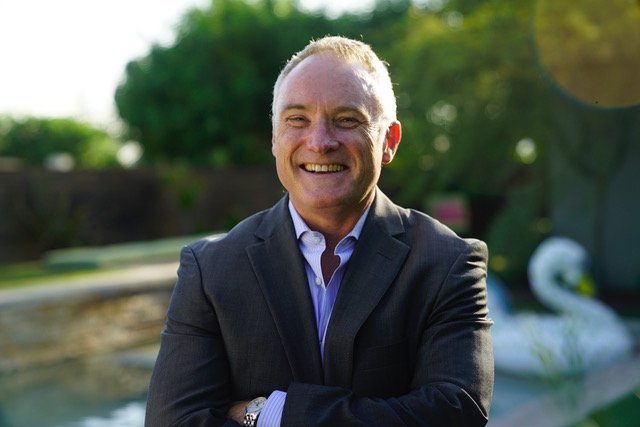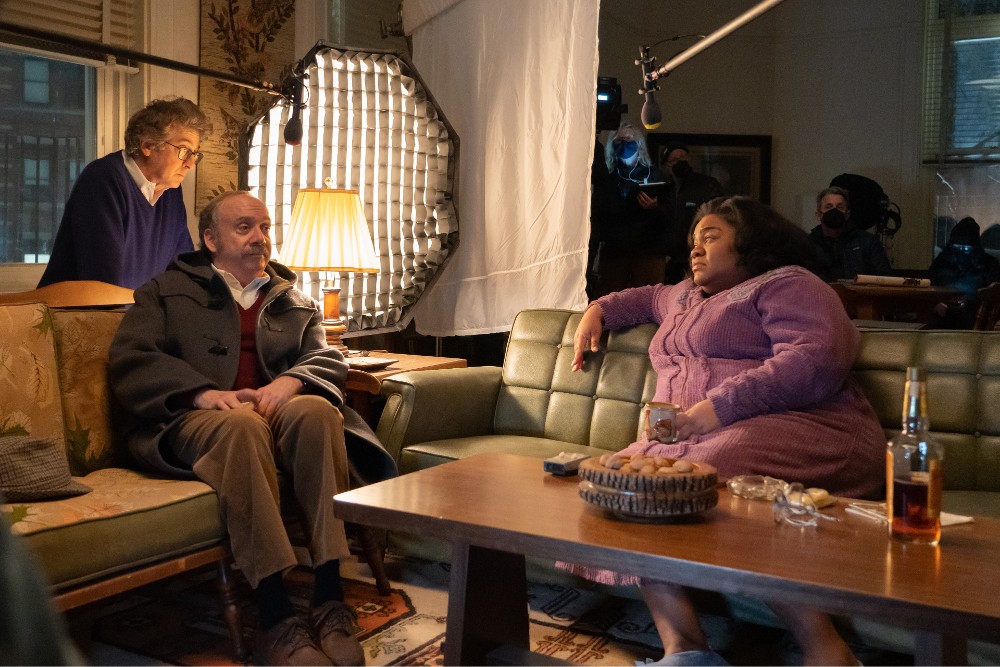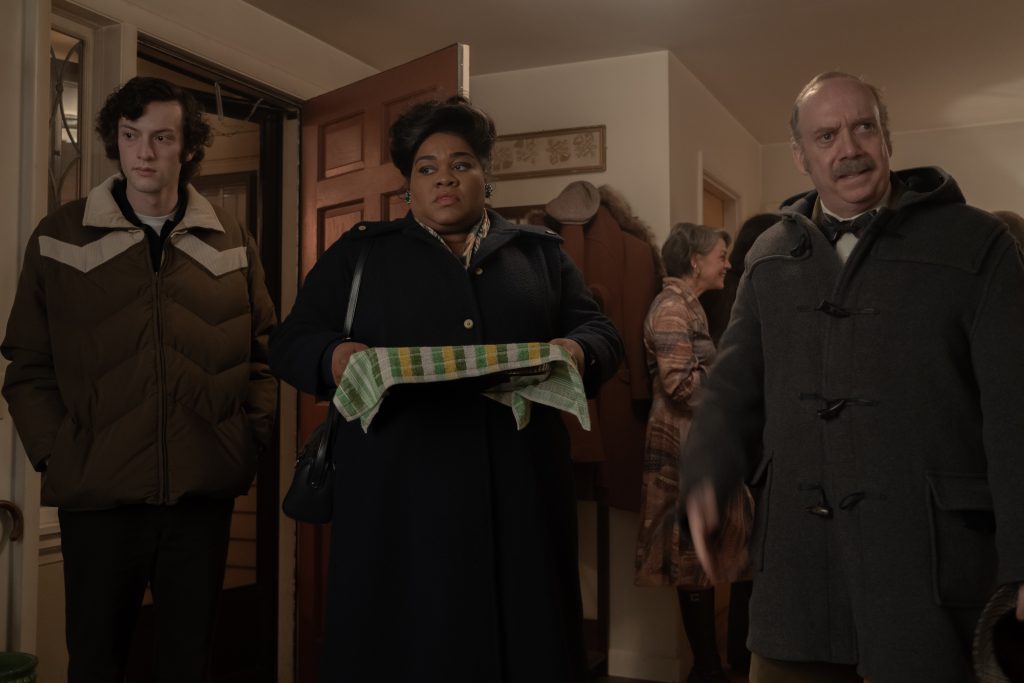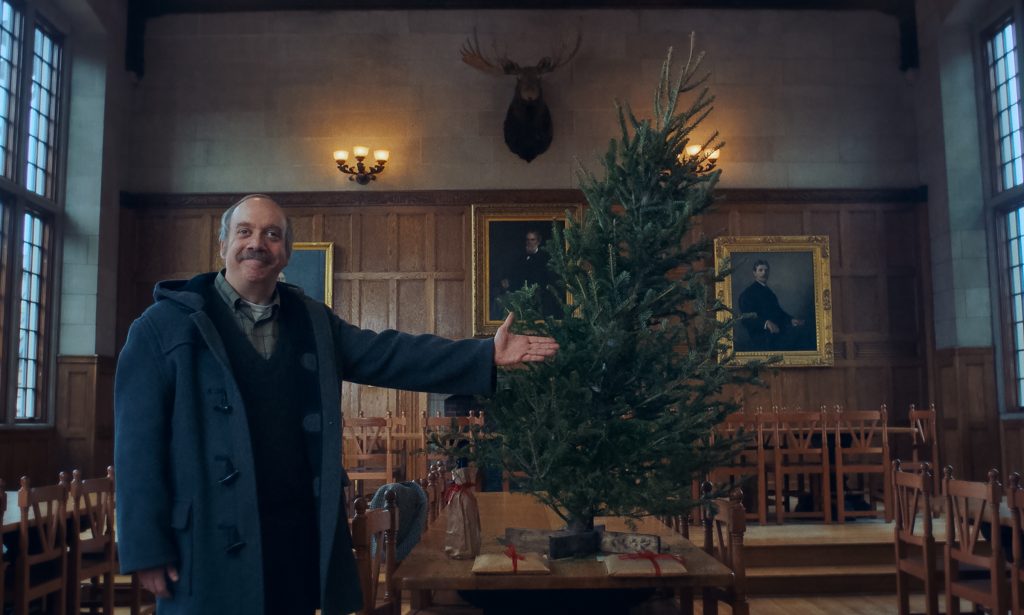
Director Alexander Payne may not be considered one of the most prolific directors, making nine features over the course of his 32 years as a filmmaker, but what is consistent is his alliance with editor Kevin Tent. Tent, who affectionately calls Payne “AP,” has worked with him since his freshman film Citizen Ruth, continuing to team up for About Schmidt, Sideways, Election, Nebraska, Downsizing, and The Descendants. His most recent and eighth collaboration with Payne is The Holdovers, a whimsical story starring Paul Giamatti as a cranky professor at an all-boys boarding school who takes a troubled student under his wing during Christmas break.
Some of Tent’s non-Payne editing gigs have been with James Mangold for Girl, Interrupted, Ted Demme for Blow, Barry Sonnenfeld for RV, and Henry Alex Rubin for Semper Fi, to name a few, but it’s his relationship with Payne that seems to be a winning one: The Descendants earned him an ACE Eddie award and an Oscar nomination. As the President of the Board for American Cinema Editors (ACE), Tent oversees the organization. Along with his career in editing, Tent is also a director, with co-directing credits on Ultra Warrior and Blackbelt II and helming Crash Pad.
Below the Line caught up with Kevin Tent via Zoom video to discuss his partnership with Alexander Payne from Citizen Ruth until now with The Holdovers and what makes their collaboration so special. Tent also reminisces about his humble beginnings in the editing room and how, despite his philosophy of less is more, he made the most of the opportunities he was given.
Below The Line: Growing up in Buffalo, New York, did you even set your sights on Hollywood?
Kevin Tent: I had this vague notion that I wanted to work in movies. That’s really it. I had gone to Oswego State University for two years. They had a broadcasting department, which was good. I was in broadcasting. Then I was like, “Nah, this is not what I want to do. I think I want to work in movies.”
I didn’t know about editing. I didn’t even know it existed, but I just kind of had this notion. So then I just dropped out of college and came to California because that’s where they make movies. So that’s about as thoughtful as I was, but it’s all worked out so far.
BTL: You go way back with director Alexander Payne. Take me back to the very beginning when you first met. What were your impressions of each other?
Tent: The very first time I met him, he called really early in the morning. I think my wife answered the phone and said, There’s some guy on the phone, and I could tell he had a lot of confidence in his voice, even at that age. I mean, we were young back then. He had this very strong presence, and he said, “I’m looking for an editor. I’m at the airport and I’m going to be flying home,” or I think he was flying to Omaha or something like that. I went over a few days later; it was at night, and I dropped off my reel to him, and he took my reel to watch, and he kind of liked it.
BTL: What was on your reel that appealed to him?
Tent: He tells a story where one of the first things on there was this little independent film that I had done called Gun Crazy, which was a very cool film and kind of at the beginning of the independent film thing happening. But it started out with a big, long crane shot, a master, and there were no cuts in it. And then it got very intense as it got violent, which was surprising and shocking to the audience. And he thought that was bold of me for an editor’s reel to have a big, long master shot at the top.
BTL: That’s ironic because you had him at a long, long shot and now all he wants to do is make things shorter.
Tent: [laughs] Yeah, exactly. But he says that it showed that I knew when not to cut, but I think he’s giving me more credit there than actually exists.

BTL: You’ve done eight films together. Why is it such a great collaboration?
Tent: Well, first of all, he’s very collaborative in general, so a lot of it goes to him. Ask anyone who works with him, like in any department. He wants to hear what you have to say. He respects what you have to say. He doesn’t always agree with it. He’ll do his own thing and do what he thinks is right, so a lot of that comes from him.
I think we both have a pretty easygoing nature, and I think even early on, our tastes were aligned as far as humor goes; we both think things are funny. He’s great to work with, and I can’t say enough great things about him because he’s a great human being.
BTL: He obviously feels the same way about you. So what were some of your early conversations with Alexander about The Holdovers?
Tent: He’ll often send me something when he sort of hones in on what he’s looking to do next to get my take on it. So he sent me maybe 40 pages of the script. Early on, I was like, “This seems like it could be great, right up his wheelhouse, and I knew he could tap into it.” Then, as the script progressed, I saw a number of different versions, and I gave him my notes on them.
I don’t remember what things I sent, but usually it’s almost always about pacing and stuff like that, or if a scene seems repetitive to another scene. Like, can’t you combine these to make this happen? I think I wrote some things about Mary’s (Da’Vine Joy Randolph) character too, if there’s ways to boost her up throughout the story. I don’t know if they did anything on that, but she works perfectly in the film now. So I remember sending a couple passes of notes to him on things, but I remember thinking they were in very good shape.
BTL: Was there a lot of improv by Paul Giamatti?
Tent: No. He totally nailed that. He was just phenomenal, and those are some real tongue-twister lines that David (Hemingson) wrote. If you tried to say at a normal speed, but he would, he would zip him out and rarely have to go back. He would rarely trip himself up and go back and hit something again. AP did a lot of takes, which is customary.
BTL: I love that you call him AP.
Tent: Oh, yeah. Well, early on, I realized I was going to be saying his name a lot in the cutting room. And I was like, “I’m just going to abbreviate it because it’s an extra syllable or two. ” Mostly, he calls me Kev or Kevin or something like that. Or, hey, you. (laughs) Or, what’s your name? He does that too. What’s your name again?

BTL: In terms of cutting scenes how precious do you need to be about all that? Do you feel guilty that you’re taking away meaty moments?
Tent: [laughs] Uh, no, it gives you great joy to cut things down, but you know what? I think we got to a good place. It’s always a balancing act, and it’s always one line too much. A scene can make it feel like it’s hanging out too long, or people start to think about their zip code or something like that. I think I’m always pushing for tightening, and then usually we tighten a little too much, and then Alexander will want to put some stuff back.
I think we get to a good spot where you’re in scenes just long enough. You don’t want them to be too short because then they won’t have the emotional punch, but they also can’t be too long because then they will also lose their emotional punch. We’re always adjusting those, and in some of the scenes with Mary and Paul in the movie, we played with those a lot. There’s parts of it that are missing; there’s chunks, but I don’t think we’ll miss anything that’s critically important or that should have been in there.
BTL: That being said, what wound up on the cutting room floor that you wish did not?
Tent: There’s nothing that I can think of that I wish was in the movie that’s not there right now. There are a few things in the movie that I wish were not there, but that’s another story [laughs], but not very many.
BTL: You’d want to do another pass if you could?
Tent: The other day, Alexander said, “Oh, you know, I would love to go back and add a few frames to these shots.” And I didn’t say it, but I was thinking, “I’d like to go back and take out another 45 seconds if I could!” But anyway, it’s all good.
BTL: How do you liaise with the music when you’re in the editing room?
Tent: Often, I’ll cut music while I’m working. Our longtime assistant editor, Mindy Elliott, has an associate editor credit on this one. She was the first one to bring in The Swingle Singers, the vocal group. I think she gave it to me to cut it in, and that triggered a kind of thematic thing that we wound up using a lot. We have “The Little Drummer Boy” in there. We have a lot of acapella music and Christmas music in there, which has worked great and really helped us out a lot.
I’ll start with pieces, and then usually we work with Richard Ford, our music editor, who’s just brilliant with music, and he’ll start doing score stuff and source cues. Then, when the time comes for the composer, Alexander likes to go off and work with the composer on his own for a while and then bring the music in when he’s happy with it. Then we start cutting it into the movie. The Christmas music was a big thing when we finally really went for it, and it worked great. It seemed ironic and just kind of funny.

BTL: Let’s go back to the beginning of your career. What was your biggest break?
Tent: I was already editing educational films, which were super lame. They were the things we used to see in high school. They were those films—super static, super boring, super lame. But I got a chance to recut a film for Roger Corman, and that’s when I really realized, “Oh, I’m actually getting paid to be an editor.” It was like a novelty to me, and that was a great place for a young person interested in editing to learn because everything moves so fast.
It was at the height, or the beginning of the height, of home videos, so Roger was making a lot of movies. Most of them were pretty lame, but there were some good ones that came out, and it was a great experience. I knew it was fun then, and I was enjoying it while I was there, but in hindsight, it really was a Wild West feel to filmmaking, which was terrific. (Cinematographer) Janusz Kaminski was there at the same time. I have editor friends that I’m still friends with now that were all down there at the same time. I look back now, and that was a really fun time.
BTL: How did you make that transition from educational films to horror films?
Tent: It was kind of a funny thing. I went to LA City College, and I had made a couple of short films, and I dropped them off down there at Roger’s, “Here’s my reel.” I’ve got a couple of short films. They had a problematic film that Roger had purchased, which was a disaster, and they needed someone to clean it up and fix it. That movie was Emmanuelle 5, and so they hired me to recut that.
I guess I was somewhat successful, so they hired me to do more. Once you got into the routine down there, you could keep it going. It wasn’t for everybody. Some people would work there for one movie and go, “I’m never going back there!” But I was like, “I’m getting paid for this. This is great.” You didn’t get paid much, but it was really a great place to learn.
BTL: How did you come to edit your first feature?
Tent: Really, the switch happened when director Tamra Davis hired me, who I went to LA City College with and who was the director of Gun Crazy. I had been doing these Roger movies, and I realized I’ve done six of them, but no one’s seeing them! I kind of lucked out when I ran into Tamra Davis at our local supermarket, who was a very big music video director at the time. She just said, “What are you doing?” I said, “I’m still editing. What are you doing?” She goes, “I’ve got my first feature off the ground. Do you want to cut it?” So, that movie gave me a kind of independent film cred, which was important, and that’s one of the things that Alexander really liked. But he also liked that I had the experience at Roger Corman’s, and I think that was one of the reasons he decided that I should be an editor on Citizen Ruth.
BTL: How would you say the two of you have changed over the years in terms of your styles and working together?
Tent: I don’t think very much has changed. I think maybe we’re both a little more confident in what we do, but we’re still the same people and hopefully better versions of ourselves. I love that I go off and work on other movies because I’m coming back a little stronger as an editor than I was the last time we worked together. He has grown too, so we both feel that way.
I think at our core, he makes going to work fun, and I like to do that, too. I think that’s always been the case. In every film, it’s never [about] us; really, it’s what the film dictates. People always say, “You have this style,” and I’m always like, “I don’t think so. I think the film dictates the style. You just adapt to it.”
The Holdovers is now playing in theaters.





